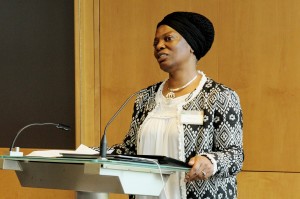Bristol’s burgeoning tech and digital sector is being held back by a lack of ethnic and gender diversity among its workforce, a panel event staged in the city has heard.
While the sector is creating jobs and wealth, it could do even better if it harnessed the talent that exists right across the city’s communities and more accurately reflected its diversity. 
Deputy mayor Asher Craig, pictured, told the Digital Diversity event held at the Bristol office of international law firm Osborne Clarke that a sector which prided itself on being “disruptive needed to “disrupt” itself by becoming more diverse, thereby stimulating even more growth.
“The digital sector has been a great success story in this city, but to the city’s tech firms I say: ‘Lack of diversity is holding you back because you should reflect the diversity of your community and your potential customer base’,” she said.
“Brexit and tightening immigration rules are coming, so tech companies need to draw on all sections of the workforce. Homegrown talent is needed to bridge the gap and Bristol is full of untapped potential.”
She said no organisation was immune to the problem, including Bristol City Counci. While women were well represented among its 6,500 or so staff, especially in top tiers of management, the outlook was poor in other areas.
For example, the majority of BME (black and minority ethnic) staff were concentrated in the lower levels of the organisation, in areas such as admin, business support and cleaning.
Also speaking at the event were Julian Hemming, chair of Osborne Clarke’s international employment law group; Monika Radclyffe, centre director of tech start-up incubator SETsquared’s Bristol hub; Dr Zainab Khan, leader for continuous enhancement at UWE; and Patrick Philpott, founder and managing director of VisionPath, a social enterprise which has worked with more than 5,000 young people across the UK to improve their employability skills.
Julian Hemming told the audience that improving diversity at Osborne Clarke was a key objective which was being driven by the firm’s managing partner Ray Berg.
“The challenge for us as a law firm is to improve our diversity and this is a big work in progress,” he said. “We are making strides in terms of gender diversity and we are looking to do more in other areas.”
Monika Radclyffe said that businesses needed to be careful of their own unconscious bias. For example, at SETsquared some of the entrepreneurs were in their 60s, whereas a wrongly held perception is that digital business was only for younger people. She said there were opportunities for people of all ages to learn new skills.
Meanwhile Patrick Philpott emphasised the importance for businesses to engage with communities for whom digital business may be a little-known concept.
“This will be of great value to business and it must not be seen as just another CSR (corporate social responsibility) exercise,” he said.
Audience member Poku Osei, CEO of Bristol-based youth empowerment social enterprise Babbasa, pointed out that “business should reach outside mainstream education and approach communities through trusted partners, be it the church, temple, mosque or other community organisation, in order to create partnerships and pathways to work”.
Pictured, from left: Patrick Philpott, Dr Zainab Khan, Julian Hemming and Monika Radclyffe 






























